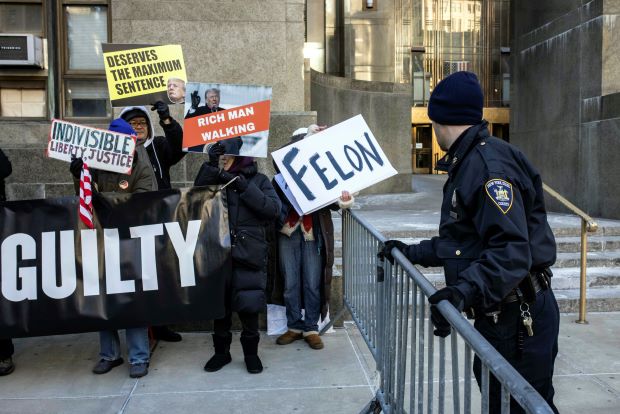Trump is sentenced in NY criminal case, but will avoid jail

By Ben Protess and Jonah E. Bromwich
NEW YORK — After months of delay, President-elect Donald Trump’s New York criminal case culminated on Friday (10) with the nation’s former and future president avoiding jail, but becoming a felon.
“Never before has this court been presented with such a unique and remarkable set of circumstances,” the trial judge, Juan M. Merchan, said at Trump’s sentencing. “This has been truly an extraordinary case.”
The judge then imposed a so-called unconditional discharge of Trump’s sentence, a rare and lenient alternative to jail or probation. Explaining the leniency, Merchan acknowledged Trump’s inauguration 10 days hence.
“Donald Trump the ordinary citizen, Donald Trump the criminal defendant” would not be entitled to the protections of the presidency, Merchan said, explaining that only the office shielded the defendant from the verdict’s gravity.
“This court has determined that the only lawful sentence that permits entry of judgment of conviction without encroaching on the highest office of the land is an unconditional discharge,” Merchan said.
The judge then wished Trump “Godspeed” and departed the bench.
Despite the lenience, the proceeding carried symbolic importance: It formalized Trump’s status as a felon, making him the first to carry that dubious designation into the presidency.
Trump appeared virtually, his scowl projected onto a screen in a chilly and bright lower Manhattan courtroom filled with reporters, sketch artists and the Manhattan district attorney, Alvin L. Bragg. The president-elect was at his Mar-a-Lago estate in Florida, seated along with one of his lawyers in front of a pair of large American flags.
“This has been a very terrible experience,” Trump said during the hearing, adding: “The fact is, I’m totally innocent.”
Asserting the primacy of the election over the verdict, he said that the voters “got to see this first-hand.”
The sentencing resulted from Trump’s conviction on charges of falsifying records to cover up a sex scandal that threatened to derail his first campaign. Once the jury convicted Trump on all 34 felony counts in May, he fought tooth and nail to avoid the spectacle of a sentencing, but on Thursday (9) the Supreme Court rejected his effort to block it.
The hearing began with a lead prosecutor, Joshua Steinglass, recapping the “overwhelming evidence” and saying that the prosecution had recommended that Trump receive the unconditional discharge.
But Steinglass still blasted Trump, saying that “far from expressing any kind of remorse for his criminal conduct, the defendant has purposefully bred disdain for our institutions and the rule of law.”
Trump, he added, “has caused enduring damage to public perception of the criminal justice system and has placed officers of the court in harm’s way.”
Trump’s lawyer, Todd Blanche, said he “very much” disagreed. He blasted the legitimacy of the case, repeating Trump’s frequent claims that it amounted to election interference.
He said it was a “sad day” for Trump’s family — and the country.
Now that Trump has been sentenced, he can begin a formal appeal of his conviction. He cannot, however, pardon himself. Presidential pardon authority does not extend to state charges.
Here’s what to know about Trump’s sentencing:
— The case: After a seven-week trial last spring, a jury of 12 New Yorkers convicted Trump on 34 felony counts of falsifying business records. The case arose from a 2016 hush-money payment to a porn star, Stormy Daniels, who was selling her story of a sexual encounter with Trump. Had she gone public, Daniels might have triggered a scandal in the final days of Trump’s 2016 campaign. Trump, the jury concluded, reimbursed his fixer, Michael D. Cohen, for the hush money and then directed that records be falsified to keep the payment under wraps.
— The punishment: Trump had faced up to four years in prison, but his election victory made incarceration a practical and constitutional impossibility. His unconditional discharge comes with no strings attached.
— A surprising decision: This month, Trump’s lawyers filed repeated requests in New York State Court to halt the proceeding, all of which failed, leading him to seek an emergency reprieve from the U.S. Supreme Court. But the high court on Thursday denied Trump’s request, a surprising show of independence from a court that has appeared sympathetic to Trump in other cases.
-New York Times


Comments are closed, but trackbacks and pingbacks are open.